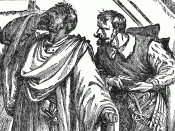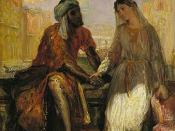The theme of racism runs throughout the text Othello by William Shakespeare. Racial prejudice was a vital component to the play and contributed to the tragedy. Constant snide references to the main character Othello's race are made in the duration of the play. The colour of the main characters was also used to symbolize heaven and hell and to create feelings of unease. Despite this, Othello can be interpreted on a much deeper level and is primarily a play about love, and the insane jealousy which can stem from love.
Othello tells the story of a black man in a white world. Othello, a black army general has recently married Desdemona, a young white Venetian girl to the disapproval of her father Brabantio. Brabantio disapproves of interracial relationships despite Othello and Desdemona's happiness and his former admiration of Othello, as Othello demonstrates in act I scene III "[Desdemona's] father loved me, oft invited me, still questioned me the story of my life".
Othello's trusted right-hand man Iago, who secretly conspires to destroy Othello draws upon this later in the play and draws upon it to enhance his evil plan, later reminding Othello "[Desdemona] did deceive her father, marrying you". This helped Iago plant seeds of doubt within Othello's mind of Desdemona's fidelity.
The play is littered with constant reference to Othello's race. Othello is constantly ostracised by other characters behind his back. Conversations between Roderigo and Iago often contain disdainful references to Othello's dark colouring. In an exchange between Roderigo and Iago in scene I, act I, Roderigo refers to Othello as "thick lips". Brabantio associates Othello with evil, and accuses him of corrupting Desdemona with "spells and medicines bought of mountebanks" (act I scene III) and describes their relationship "against all rules of nature". In another exchange...
![From the Library of Congress: TITLE: Thos. W. Keene. Othello CALL NUMBER: POS - TH - 1884 .O7, no. 1 (C size) [P&P] REPRODUCTION NUMBER: LC-USZC6-58 (color film copy transparency) RIGHTS INFORMATION: No known restrictions on publication. MEDIUM: 1 print (](https://s.writework.com/uploads/9/94760/library-congress-title-thos-w-keene-othello-call-number-pos-thumb.jpg)


Othello essay
good essay - very in depth
0 out of 0 people found this comment useful.